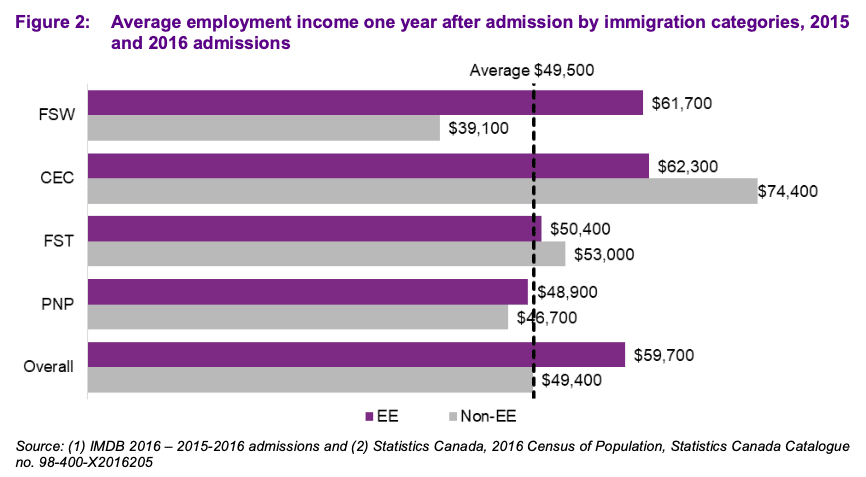How early Express Entry immigrants fared in the labour market: study
Nearly all Express Entry immigrants found employment in the first year after landing, and, generally, outperformed immigrants who came through the previous application system.
A recent Immigration, Refugee and Citizenship Canada (IRCC) report looked at how Express Entry immigrants were faring in the Canadian labour market between 2015 and 2018. They compared results of the groups of people who applied through the electronic Express Entry system, and non-Express Entry immigrants who still used the old paper-based application system.
All respondents in the survey applied for immigration through either the Federal Skilled Worker Program (FSWP), Federal Skilled Trades Program (FSTP), Canadian Experience Class (CEC), or an enhanced Provincial Nominee Program (PNP).
Express Entry immigrants saw “generally positive,” results in the three years following the launch of the electronic application management system in January, 2015. Though results show favourable outcomes in the short term, IRCC noted that Express Entry was designed to select immigrants who would be successful over the long term.
Find out if you are eligible for Canadian immigration
Express Entry immigrants tended to have stronger outcomes than non-Express Entry immigrants in the labour market. In the first year after immigration, 95 per cent of Express Entry immigrants were employed, compared to 87 per cent of non-Express Entry immigrants who were hired in the same timeframe. Of those Express Entry immigrants who got jobs in the year after they immigrated, about 83 per cent of were working in their field of expertise.
When breaking down immigrant employment by program, Express Entry applicants were always more likely to be employed. FSWP and CEC immigrants saw the highest rates of employment when they applied through the Express Entry system.

Express Entry immigrants were also most likely to be employed in higher skilled occupations than non-Express Entry immigrants.
One year after admission to Canada, Express Entry immigrants earned about 20 per cent more in annual salaries than non Express Entry immigrants. Express Entry immigrants also earned an average of $10,200 more per year than Canadian-born workers.
CEC and FSTP immigrants were the only exceptions, as non-Express Entry immigrants in these programs actually earned more after their first year in Canada. When IRCC looked at other variables, they found that the differences in earnings came from differences in intended occupation, age, gender, education, and others.

Non-Express Entry immigrants started in lower-skilled jobs, saw more advancement
Both Express Entry and non-Express Entry immigrants saw more career advancement in terms of employment income. Non-Express Entry immigrants were more likely to report career advancement, but also that their first jobs in Canada were lower-skilled.
More than one third of all respondents reported that, at the time they filled out the survey, they were no longer working in the same job that they first had in Canada. More non-Express Entry immigrants (41 per cent) reported that they had changed jobs, compared to Express Entry respondents (36 per cent).
Of those who changed jobs, a larger proportion of non-Express Entry immigrants (34 per cent) said they had changed jobs to a higher National Occupational Classification (NOC) skill level, compared to Express Entry immigrants (24 per cent). However, Express Entry immigrants were more likely to change jobs within the same NOC skill level.
Non-Express Entry respondents were more likely to start working in lower-skilled occupations with NOC C or D.
"As a result, non-EE respondents in lower skilled occupations would have more opportunities for upward mobility," the report read.
Both Express Entry (83 per cent) and non-Express Entry (85 per cent) immigrants reported that their income increased between their first job and the job they had at the time of the survey.
Find out if you are eligible for Canadian immigration
© 2020 CIC News All Rights Reserved
- Do you need Canadian immigration assistance? Contact the Contact Cohen Immigration Law firm by completing our form
- Send us your feedback or your non-legal assistance questions by emailing us at media@canadavisa.com







